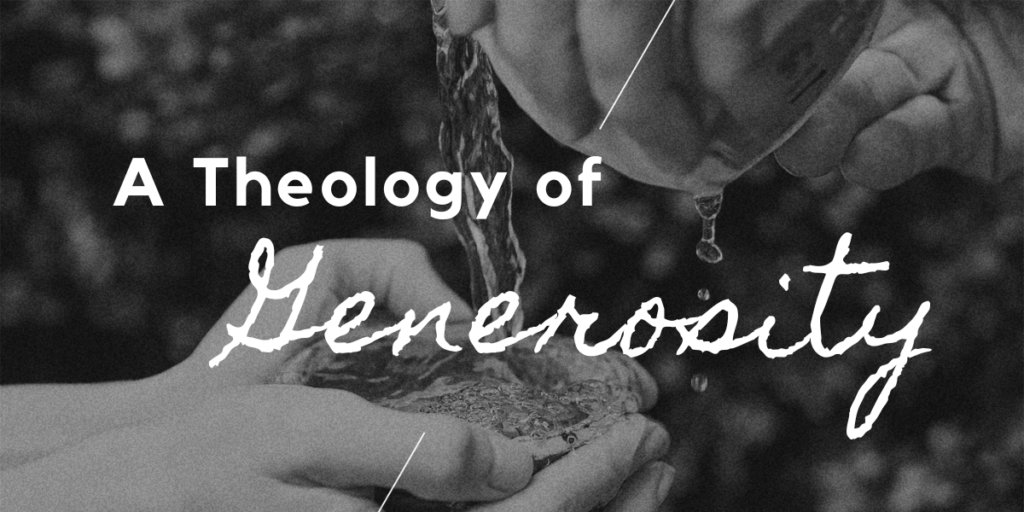
Generosity as a Gospel Bridge
Hugh Jackman is one of my favorite actors. Say what you will, but the man is talented. He can act, sing, and dance with the best of them – not to mention he also plays an impressive superhero. Jackman even got me to expand my musical repertoire when he starred in the 2012 on-screen adaptation of Victor Hugo’s Les Miserable. He played none other than Jean Valjean.
The most powerful scene is when Valjean, recently released from prison, is given shelter by Bishop Myriel of Digne. When no one else would take in the former prisoner, the bishop generously (and scandalously) opened his home to the ex-convict.
 The bishop’s altruism does not stop there. In the middle of the night, Valjean takes advantage of the bishop’s hospitality and steals his silverware. Unfortunately, he is not the best criminal and is immediately caught. Valjean returns to the bishop’s house, where he assumes he will be condemned. However, the story takes a dramatic twist. When Bishop Myriel sees the beaten and chained Valjean, he has incredible compassion. Valjean listens, dumbstruck, as the bishop informs the police that the items were gifts from the bishop. Myriel even throws a couple of silver candlesticks into his bag. Valjean is unexpectedly released.
The bishop’s altruism does not stop there. In the middle of the night, Valjean takes advantage of the bishop’s hospitality and steals his silverware. Unfortunately, he is not the best criminal and is immediately caught. Valjean returns to the bishop’s house, where he assumes he will be condemned. However, the story takes a dramatic twist. When Bishop Myriel sees the beaten and chained Valjean, he has incredible compassion. Valjean listens, dumbstruck, as the bishop informs the police that the items were gifts from the bishop. Myriel even throws a couple of silver candlesticks into his bag. Valjean is unexpectedly released.
After the police leave, the bishop leans in closely to Valjean. Myriel looks at Valjean and says, “My brother, you no longer belong to evil, but to good. It is your soul that I buy from you; I withdraw it from black thoughts and the spirit of perdition, and I give it to God.” From that point on, Valjean turns his life over to God and lives out the effects of God’s grace through his own generosity and selfless living.
This powerful scene conveys a profound truth: Grace-filled generosity is the story of the Gospel. Scripture has plenty of similar “Valjean” stories. In Acts 6, for example, a group of Greek-speaking Jewish widows felt neglected. What did the disciples do? They appointed seven deacons to watch over them. We are told in the next verse that because of their generous service, “The word of God spread. The number of disciples in Jerusalem increased rapidly, and a large number of priests became obedient to the faith.” We find in Acts 6 that generosity was a bridge for the Gospel.
 The bridge of generosity continues to spread the Gospel today. My friend, Bill, serves as a church’s rector in Jacksonville, FL. A few years ago, a group of Sudanese refugees was relocated near his church. They came to the United States with nothing. His church decided to invite the families to a cookout. Unfortunately, the church prepared pork hotdogs for Muslim refugees. After a quick trip to the grocery store, everyone broke bread over hamburgers and beef hotdogs. As the families of the church spoke with Sudanese families, the church members realized the needs of the refugees extended beyond a simple meal and conversation. The next day, the church assembled a drive to fulfill the necessities. Their generosity did not stop there. Some parishioners were teachers and began to offer tutoring to help the students adjust to the American education system. A group of retirees began a carpooling service. What was the result of this small church’s generosity? The refugee families started to attend services. That’s right—Muslim men, women, and children started attending church. Some have even come to place their faith in Jesus. This church’s generosity constructed a bridge to the Gospel.
The bridge of generosity continues to spread the Gospel today. My friend, Bill, serves as a church’s rector in Jacksonville, FL. A few years ago, a group of Sudanese refugees was relocated near his church. They came to the United States with nothing. His church decided to invite the families to a cookout. Unfortunately, the church prepared pork hotdogs for Muslim refugees. After a quick trip to the grocery store, everyone broke bread over hamburgers and beef hotdogs. As the families of the church spoke with Sudanese families, the church members realized the needs of the refugees extended beyond a simple meal and conversation. The next day, the church assembled a drive to fulfill the necessities. Their generosity did not stop there. Some parishioners were teachers and began to offer tutoring to help the students adjust to the American education system. A group of retirees began a carpooling service. What was the result of this small church’s generosity? The refugee families started to attend services. That’s right—Muslim men, women, and children started attending church. Some have even come to place their faith in Jesus. This church’s generosity constructed a bridge to the Gospel.
Generosity is not just a bridge for the poor and marginalized to hear the Gospel. Another friend, Sam, an orthopedic surgeon, told me how he ministers to his neighbors by brewing his own craft beer and then gifting it to them. He also invites anyone who moves to the neighborhood to join him for an afternoon of golf at his club. As you can imagine, Sam lives in an area where everyone can afford their own beer and golf. Sam’s generosity, however, has still had an incredible impact. According to him, he now has 10 (white) neighbors attending his Chinese Baptist church. How did that happen? As Sam put it, “How can someone turn down an offer to go to church when you’ve given them a gift and treated them to golf?” The wonderful part is that his neighbors continue to go and hear the Gospel Sunday after Sunday.
 Generosity is about far more than money. God is lavishly generous towards us in a thousand ways. We see this most clearly in the life Jesus modeled for us. As Paul says in Ephesians, “Christ loved us and gave himself up for us as a fragrant offering and sacrifice to God.” God’s powerful generosity through the gospel saves us and sets us free to live new, open-hearted lives. These lives are no longer marked by their inward, selfish focus but by an outward flow towards others with an open, generous hand. The Church is at its best and most powerful when following God’s lead of generosity.
Generosity is about far more than money. God is lavishly generous towards us in a thousand ways. We see this most clearly in the life Jesus modeled for us. As Paul says in Ephesians, “Christ loved us and gave himself up for us as a fragrant offering and sacrifice to God.” God’s powerful generosity through the gospel saves us and sets us free to live new, open-hearted lives. These lives are no longer marked by their inward, selfish focus but by an outward flow towards others with an open, generous hand. The Church is at its best and most powerful when following God’s lead of generosity.
If generosity is weak, then something is weak in the spiritual hearts of our congregations. So, we must ask ourselves, “Does lavish generosity mark our lives?” We need to ask this of ourselves both corporately as the body of Christ and individually. Is Christ Church Anglican a community known for its extravagant generosity? We do not want to only look at how much money we have given but also how many generous bridges have been built. Am I a person known for my generosity?
These questions, while difficult, are essential because generosity is a basic fruit of a Jesus-centered life. While we were yet sinners, God bridged the gulf between us and Him by generously giving Himself for our salvation. Our generosity, then, is a glad response to our gracious God and a reflection of his generosity to us. This is a gift worth sharing. It is a glad response to our gracious and generous God.
Fr. Chase

